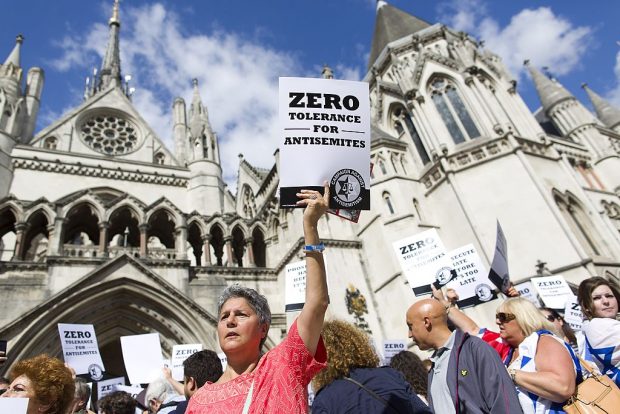Growing up as a Jew in England, I’ve always felt proud of my heritage. The ugly spectre of anti-Semitism seemed a thing of the past – and it felt safe to share my faith and ancestry with the world. But not any longer.
It’s not difficult to see why. In the first half of 2016, there was an 11 per cent spike in the number of anti-Semitic incidents. Britain might still be one of the safest places in the world to be a Jew, but Jews here are increasingly becoming a target. Last year saw the third-highest annual total of anti-Semitic hate incidents in the UK ever recorded. The same organisation that reported that rise, the Community Security Trust, has demonstrated that this worrying jump isn’t a one off. Back in 2004, it said there had been 532 anti-Semitic incidents. That was the highest annual total they’d reported since the eighties. Yet by 2014, that figure had shot up 220 per cent, to 1,168.
Even our university campuses – supposedly hubs of free speech and freedom of thought – aren’t immune to the rise of anti-Semitism that is permeating Europe. Last month, students from the pro-Israel ‘StandWithUS’ society at University College London met to hear an address from Israeli writer Hen Mazzig, who also happens to be a former solider in the Israeli Defence Forces. As the talk began, pro-Palestinian protestors yelled ‘free, free Palestine’ and ‘murderers’. Police were called and Jewish students had to barricade themselves in the room. Devora Khafi, a campus director for pro-Israel group StandWithUs wrote on Twitter: ‘I was assaulted. We were attacked. But freedom will prevail’.
These were messy scenes but the sad truth is that these sorts of stories are hardly exceptional. Last year, a former Chair of the Oxford University Labour Club resigned from his post, claiming that a high proportion of members seemed to have ‘some kind of problem with Jews’.
In June, Zachary Confino, a Jewish student at York University received a public apology and £1,000 from the Student Union for the anti-Semitic abuse he was subjected to over two years as an undergraduate. The taunts, which included ‘Jewish prick’ and ‘Israeli twat’ were, he said, not acted upon quickly enough by the university. This type of incident should have acted as a spur for universities to realise anti-Semitism was alive and well. Yet over the summer, the NUS voted to remove the right of Jewish students to vote for their Jewish representative on the union’s Anti-Racism and Anti-Fascism Committee – a worrying lack of representation for a student group which is being increasingly targeted. These feelings of concern within the Jewish community were clear when, in September, 44 student leaders signed an open letter saying that: ‘Jewish students have not felt safe participating in our national movement’.
This climate is possibly even affecting which universities Jewish people are choosing to study at. More and more Jewish students appear to be picking universities based on the size of their existing Jewish communities. The Union of Jewish Students estimates that more than sixty per cent of Jewish students attended one of six universities – Leeds, Oxford, Cambridge, Manchester, Nottingham and Birmingham. To give some idea of comparison, less than one in ten students in the country attend this group of universities. Attempts to explain this phenomenon have ranged from convenience to easier access to Kosher food. But is the truth as to why so few Jewish students are opting to study elsewhere more troubling?
Whatever is going on, it’s no surprise that some Jews are feeling on the periphery of campus culture. All too often, criticism of Israel seems to be a scant cover for criticism of Jews generally. As Jews, we’re expected – for some unknown reason – to have some kind of innate and stubborn loyalty to Israel and the Zionist cause.
This isn’t the case. Zionism means the belief in the right of existence of the State of Israel. But it doesn’t mean that we think Israel should be immune to criticism. I, like thousands of other Jews, disagree with the actions of the state of Israel routinely. Its so-called ‘Peace Wall’, which separates Israel from the West Bank, and its actions in the 2014 Gaza War, are both occasions where I think Israel has been wrong. Yet a sizeable chunk of the left is happy to turn a blind eye to the sins of other countries in their myopic focus on the wrongs of Israel. From here, it’s just a short hop to anti-Semitism.
At the very least, a pattern of behaviour in the Labour party is hardly making Jews feel welcome. After a summer in which the Chakrabarti report identified a ‘toxic atmosphere’ in the party, last month’s Momentum conference in Liverpool saw the ‘Jewish Anti-Zionist Network’ handing out leaflets accusing the ‘Jewish Labour Movement’ of being ‘a representative of a foreign power, Israel’. The leaflet also asked ‘why is there so much emphasis on anti-Semitism, rather than other much more prevalent forms of racism?’. These are just some examples of the left’s troubling tendency to target Israel in isolation.
These attacks aren’t only confined to fringe events though. Only last week, Baroness Tonge, a Liberal Democrat peer resigned from the party after chairing a meeting in which Israel was compared to IS and Jews were blamed for the Holocaust. Worryingly, this wasn’t a sentiment being bandied around in some town hall but in Parliament itself. The spread of anti-Semitism – from university campuses to the heart of Westminster – is pernicious. Many may think of anti-Semitism as being a disease of another time. I, too, shared that belief. Yet the troubling truth is that this is wrong: anti-Semitism is alive and well. It’s time to kill it off before it’s too late.






Comments